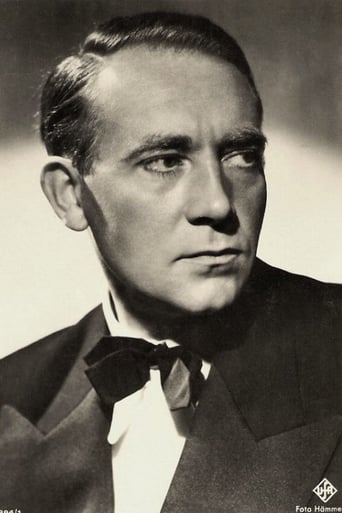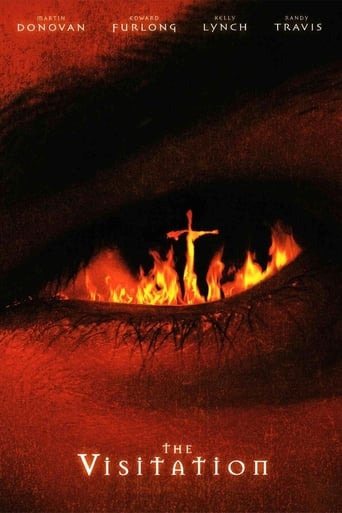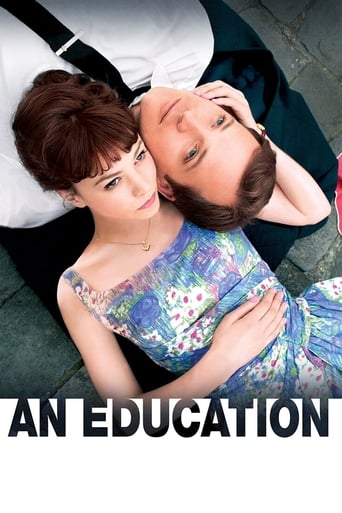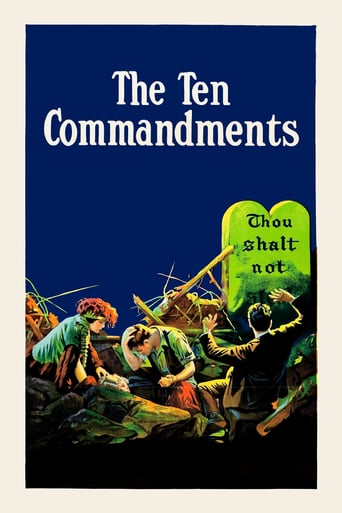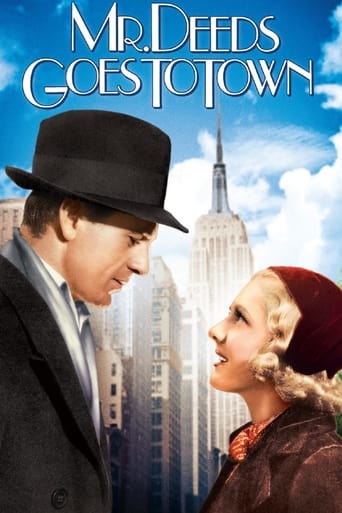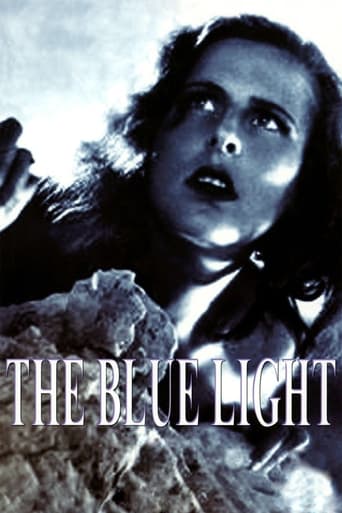
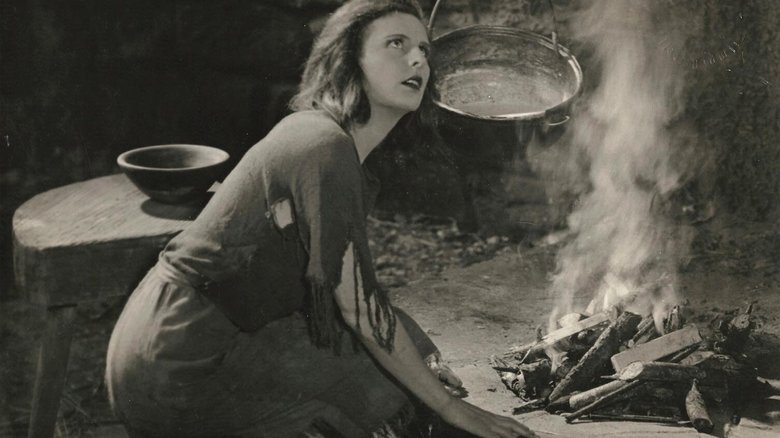
The Blue Light (1934)
A young woman, Junta, lives apart from her village and, for her solitude and strangeness, is considered to be a witch; when she comes to the village for one reason or another, the townsfolk chase her away. They feel that she may in some way be responsible for the deaths of several young men of the village, who have felt compelled, one by one, to climb the local mountain - and fall to their deaths - on nights when the moon is full.
Watch Trailer
Cast
Similar titles
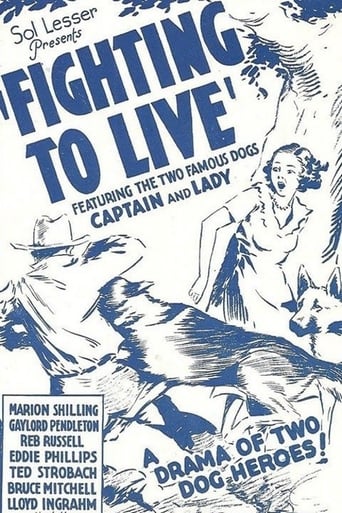
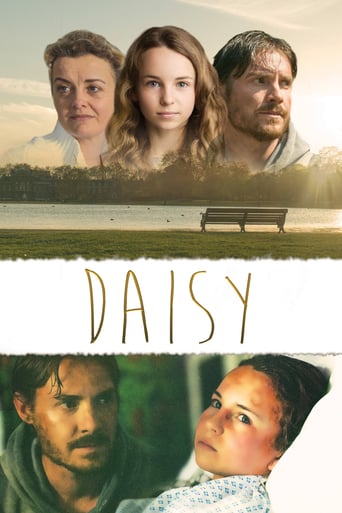
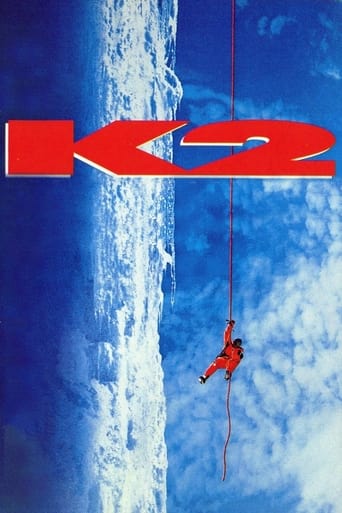

Reviews
Don't Believe the Hype
The movie's neither hopeful in contrived ways, nor hopeless in different contrived ways. Somehow it manages to be wonderful
It's the kind of movie you'll want to see a second time with someone who hasn't seen it yet, to remember what it was like to watch it for the first time.
An old-fashioned movie made with new-fashioned finesse.
"Das blaue Licht" or "The Blue Light" is a German black-and-white film from over 80 years ago. Writer, director and lead actress is Leni Riefenstahl and this film is one of the main reasons that brought Riefenstahl the adoration of Adolf Hitler, who made her his number-1 propaganda documentary filmmaker for years to come. This one, however, was still made before the Nazi party came into power. Riefenstahl plays a woman, dishonored by society, who lives in the mountains. The men lover her though and several men go to the mountains because of her, where they die from falling in the rocky, rough landscape. However, when the main character, Junta, finally warms up to a man courting her, she is about to face the most severe form of betrayal.The reason is that this is not only a film about love and interhuman relationships, but also about trust and a huge treasure. I must say I liked the ending here. But I am not sure if it is worth waiting for 80 minutes as most of the scenes before aren't really that great or memorable. As solid as Riefenstahl's and Béla Balázs' work behind the camera is, I am not too sure if casting the filmmaker for the main character was a good choice here. She does not have the looks for being considered some sort of femme fatale. Then again, tastes differ, and were probably especially different that long ago. This is a sound film, but there is no color yet and this fact really hurts the film as you could expect with a color being included in the title even. As a whole, I do not recommend the movie. Simply not good enough.
Leni Riefenstahl proves that she has an extraordinary mastery of cinematographic techniques in her directorial debut. One of the best entries in the "Mountain Film" genre, Das Blaue Licht conveys a strong sense of atmosphere. It transports its audience into the world of a little folkish, insular Germanic village sometime in the relatively recent past.The mountain overshadows the villagers just as it overshadows everything in this story. Climbing it can be read as a metaphor for human ambition which, telling, comes at the destruction of the lives of others and environmental degradation.Riefenstahl uses a simple but effective framing device to tell her story, which serves to situate it firmly in the realm of the village's folklore. Moody lighting helps add to the atmosphere and she displays effective use of parallel and contrasting scenes. The scale of the mountain and its treacherous, narrow paths give the film a nicely-claustrophobic feel. Certainly more effective as a director than as an actress, the tragedy is that Riefenstahl would later waste her skills making political propaganda.The contrast between Riefenstahl's character and the insular, narrow-minded country people is effectively conveyed. (Ironically, it is these same bigoted people from the Bavarian country town folk who would later form the Nazi party's biggest support base. By portraying the countryside dwellers for the bigots they are, this film could almost be read as an attack on what would become the NSDAP's support base.) As others have commented, the male lead is drawn straight from the writings of Goethe and is effective as a nuanced, compassionate counterpoint to the villagers.Ultimately, this film is highly recommended, provided one feels comfortable watching Riefenstahl's early output on its own merits and separating the artist's early work from her political beliefs and later propaganda films.
Leni Riefenstahl's directorial debut (she had been a widely recognised and praised dancer in the 20's and gone on to be one of the most well known silent movie stars, working with Arnold Fanck and G W Pabst on a series of mountain films). Here she shows that magnificent eye exciting visuals probably attainted while shooting up in the mountains with Fanck, and which would go on to make Triumph of the Will the most stunning, famous propaganda film of all time, and Olympia, her film of the 1936 Berlin Olympics the single most famous (and incredible visually) sports documentary of all time.In The Blue Light you will find some of the most stunning visuals in early sound cinema, a gorgeous score and the magnetic, sensual screen presence of Leni herself in the lead role of Junta, the outcast who lives among the crystals in a mountain high above a fairytale village. It is a delight to watch, and one of the great treasures of early sound cinema, in my opinion (though the best things in it have more in common with the dancelike visual grace of the silent screen, than the stagey, wordy early talkies from Hollywood).
WARNING.....SLIGHT SPOILER!!!!Leni Riefenstahl is fantastic in this film, which she directed, wrote, and starred in. This movie is generally considered to be a German 'mountain film', to which Refenstahl generally takes a great deal of influence from, though it came out significantly later than most of the films from that genre, such as `The White Hell of Piz Palu' (Die Weiße Hölle vom Piz Palü) or `Storm Over Mont Blanc' (Stürme über dem Mont Blanc) both of which Riefenstahl herself starred in.This is a movie about nature and modern man's disrespect for it. Vigo, an urban citizen who comes to a village in the mountains, meets Junta (Riefenstahl), an outcast believed by most of the villagers to be a witch. Vigo discovers that Junta is the only person known to have climbed the mountain to the cave where a 'blue light' shines on every full moon. The light, which is believed by the villagers to hypnotize young men, is blamed for the countless deaths of the villagers who attempt to climb the mountain only to fall to their deaths. When Vigo discovers Junta and followers her to the cave, he realizes that the 'light' comes from millions of valuable jewels that lie in the walls of the mountain. Although by this point Vigo has formed a romantic relationship with Junta, instead of keeping the jewels a secret and thus, sacred (as Junta does) he decides to tell the villagers, who rape the mountain of its riches and become wealthy. The outcast Junta gets nothing, and is devastated because the light which once glimmered from the mountain is now gone.Vito is constantly portrayed as a `Goethe type' - the 19th century archetype intellectual, and we know that he is used to symbolize the higher echelon of German society. Junta, however, is an outcast and a social misfit. She is filmed much like an animal of sorts...wearing rags, hunched over, and constantly running from villagers who want to stone her to death. When Junta and Vito get together, it becomes obviously unnatural and awkward. The fact that Junta and Vito also do not speak the same language is paramount to the notion that communication between nature and high society does not exist. In the end, he uses her knowledge, and chooses financial wealth over love. This is a message (albeit a depressing one) to modern civilization everywhere, delivered with expressionistic flair and a filmatic brilliance that won't be found anywhere else.

